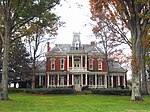Warner Parks

Edwin Warner Park and Percy Warner Park, collectively known as Warner Parks, are two major public parks in Nashville, Tennessee. They are part of the park system managed by the Metropolitan Board of Parks and Recreation of Nashville and Davidson County. Percy Warner Park's front entrance is located at the end of Belle Meade Boulevard. The parks are listed on the National Register of Historic Places as Warner Park Historic District. The district is primarily within Nashville along the southern edge of Davidson County, Tennessee, but it extends into Williamson County, Tennessee as well. The two parks are adjacent to each other, separated by Old Hickory Boulevard, and are located approximately 9 mi (14 km) from downtown Nashville. They are bounded on the northwest by Tennessee State Route 100, on the east and north by Chickering Road, and partially on the south by Old Hickory Blvd. and Vaughn Road. The two parks cover 2,684 acres (1,086.2 ha), making the combined parks the second largest municipal park in the state (after Bays Mountain Park in Kingsport which is 3,750 acres). The parks offer a variety of activities, including hiking trails, cross country courses, and an equestrian center.Through funds raised by Friends of Warner Parks, the Warner Parks system added 448 acres in late 2014, expanding the park to more than 3,000 acres. Two properties were purchased for this expansion to enhance the park resources, including the 225-acre Burch Reserve with wooded hills and an old-growth forest previously owned by H. G. Hill Realty. The Burch Reserve is home to Nashville's largest cave in addition to small ponds, meadows and forestry. Ridges and hollows of the former H. G. Hill property are part of what is considered the largest old growth forest in an urban area east of the Mississippi.
Excerpt from the Wikipedia article Warner Parks (License: CC BY-SA 3.0, Authors, Images).Warner Parks
Mossy Ridge Trail, Nashville-Davidson
Geographical coordinates (GPS) Address Nearby Places Show on map
Geographical coordinates (GPS)
| Latitude | Longitude |
|---|---|
| N 36.063055555556 ° | E -86.891666666667 ° |
Address
Mossy Ridge Trail
Mossy Ridge Trail
Nashville-Davidson
Tennessee, United States
Open on Google Maps







